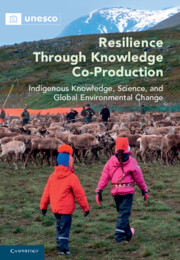 Resilience through Knowledge Co-Production
Resilience through Knowledge Co-Production Book contents
- Resilience through Knowledge Co-production
- Resilience through Knowledge Co-production
- Copyright page
- Contents
- Contributors
- Acknowledgements
- Introduction
- Part I From Practice to Principles
- Part II Indigenous Perspectives on Environmental Change
- Part III Global Change and Indigenous Responses
- 12 Competing Paradigms of Himalayan Climate Change and Adaptations: Indigenous Knowledge versus Economics
- 13 Coping with a Warming Winter Climate in Arctic Russia: Patterns of Extreme Weather Affecting Nenets Reindeer Nomadism
- 14 Rising Above the Flood: Modifications in Agricultural Practices and Livelihood Systems in Central Amazonia – Perspectives from Ribeirinho and Indigenous Communities
- 15 Indigenous Storytelling and Climate Change Adaptation
- 16 Indigenous Knowledge and the Coloniality of Reality: Climate Change Otherwise in the Bolivian Andes
- Epilogue
- Index
- References
16 - Indigenous Knowledge and the Coloniality of Reality: Climate Change Otherwise in the Bolivian Andes
from Part III - Global Change and Indigenous Responses
Published online by Cambridge University Press: 02 June 2022
- Resilience through Knowledge Co-production
- Resilience through Knowledge Co-production
- Copyright page
- Contents
- Contributors
- Acknowledgements
- Introduction
- Part I From Practice to Principles
- Part II Indigenous Perspectives on Environmental Change
- Part III Global Change and Indigenous Responses
- 12 Competing Paradigms of Himalayan Climate Change and Adaptations: Indigenous Knowledge versus Economics
- 13 Coping with a Warming Winter Climate in Arctic Russia: Patterns of Extreme Weather Affecting Nenets Reindeer Nomadism
- 14 Rising Above the Flood: Modifications in Agricultural Practices and Livelihood Systems in Central Amazonia – Perspectives from Ribeirinho and Indigenous Communities
- 15 Indigenous Storytelling and Climate Change Adaptation
- 16 Indigenous Knowledge and the Coloniality of Reality: Climate Change Otherwise in the Bolivian Andes
- Epilogue
- Index
- References
Summary
Several studies have shown that indigenous peoples are among the most vulnerable to the effects of climate change, and attention has been drawn to indigenous knowledge as an important component of climate change adaptation strategies. This paper argues, however, that in order to take indigenous knowledge seriously, indigenous realities and understandings of climate change need to be taken seriously. This is because knowledge is not produced in an ontological void. Rather, knowledge is produced in relation to notions concerning the nature of reality and being. Moreover, in order not to make a mere instrumentalist use of Indigenous knowledge, this paper argues that the practical outcomes of Indigenous knowledge ought to be acknowledged, along with the ontological lifeworlds within which such knowledge is generated.
This paper is based on many years of ethnographic fieldwork with and among Aymara people in the Bolivian Andes and poses questions about how the partial connections between different ways of producing knowledge, of experiencing and explaining climate change, and of experiencing and generating realities are transformed into spaces of conflict, domination and resistance.
Keywords
Information
- Type
- Chapter
- Information
- Resilience through Knowledge Co-ProductionIndigenous Knowledge, Science, and Global Environmental Change, pp. 261 - 274Publisher: Cambridge University PressPrint publication year: 2022